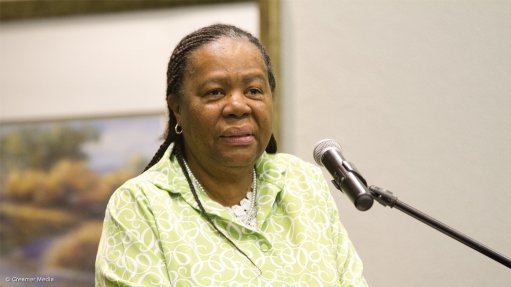
Science and Technology Minister Naledi Pandor
Photo by: Duane Daws
Computing giant IBM has launched its second research, development and innovation laboratory in Africa, which would focus on applying information and communications technologies (ICT) to healthcare, mining and urbanisation challenges.
The laboratory would be part of the University of the Witwatersrand (Wits) Johannesburg Centre for Software Engineering Tshimologong precinct in Braamfontein, Johannesburg, and would provide full bursaries for undergraduate and postgraduate students in ICT and related subjects.
Further, this R700-million investment over ten years would provide internships, mentoring opportunities, access to IBM's 12 laboratories across the world and help to develop new innovations and intellectual property to deal with local and regional challenges.
The investment formed part of IBM's broad-based black economic-empowerment (BEE) equity equivalent investment and would also see the company providing start-up support and enterprise development for black and black female entrepreneurs from entry-level through to bankable feasibility stage of enterprise development, specifically on ICT and related applications, said IBM governmental programmes executive Gavin Pieterse on Friday.
Science and Technology Minister Naledi Pandor lauded the investment, which was the first to use BEE financial instruments to develop research, development and innovation capacity in South Africa, and noted that it would focus on smart decision-making analytics, cloud technologies and next-generation infrastructure. The centre would also collaborate with the other ICT and innovation initiatives and research organisations in South Africa.
"ICT is required to strengthen our economic competitiveness, as described in the National Development Plan, and we are thrilled that the lab will have access to the world-class research and innovation capacity of IBM's research labs around the world," she said.
The laboratory would be hosted at the IBM offices in Bryanston until the centre in Braamfontein was completed at the end of this year.
Massachusetts Institute of Technology optical physicist and IBM South Africa research laboratory director Dr Solomon Assefa noted that the laboratory was already operational and was defining projects in collaboration with departments at Wits, initially focused on the three main areas of healthcare, smart mining and urbanisation.
The laboratory was the second IBM research laboratory on the continent and would support the work of the centre in Nairobi, Kenya.
"The [laboratory] will also focus on supporting innovation, specifically breakthrough innovations, which is important for international competitiveness and economic development, not only for South Africa, but also for Africa and aims to develop globally relevant innovations for IBM," said Assefa.
"[It] provides an opportunity to draw institutions of higher learning in the region, as well as local government, into collaboration to use ICT and innovation for development, in which my department will play a role in exploiting and ensuring that this research, development and innovation help to drive development in South Africa and Africa," added Pandor.